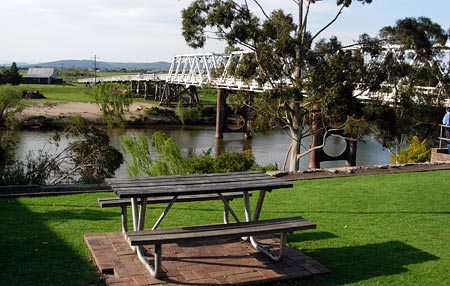Where to live: Morpeth?
We’re planning on leaving Sydney in the next year or so, due to starting a family and needing a 4-bedroom house. But where to move to? The choice is overwhelming. In this series of posts, I explore a plethora of possible places – many of which we’ve visited – in an attempt to reach some sort of conclusion. Next up – Morpeth.
Morpeth is a sleepy little village of just over 1,000 inhabitants. It’s on the edge of the Hunter valley, northwest of Newcastle, and sits on a gentle bend of the Hunter river.
Unlike many country towns in Australia, Morpeth actually has a bit of history to it, which appeals to us. It used to be a river port, transporting coal and people via steamer to Paterson, Maitland, Newcastle and Sydney. The village is full of historic sandstone buildings, including the riverside Arnott Bakehouse, owned by the original Arnott family (of biscuit fame). In fact the village is so historic that it has National Trust status.

A big plus with Morpeth is that it’s just 37km from a big city – Newcastle – which means you’re never that far from the action (though if you’re not driving then it’s a 6km walk or cycle ride to the nearest train station in East Maitland). It’s almost exactly 2 hours’ drive from Sydney, too, should we ever need to head into the Big Smoke. It’s well served by schools, with a primary school in town and two good public high schools in East Maitland.
I had a good chat with the chef of the cafe where we had lunch. (That’s a great tip for checking out a town by the way – have lunch in a local cafe, then quiz the staff on what it’s like to live there.) He said it’s a great place, with a good community feel. Fairly quiet in the evenings (unsurprisingly), but otherwise pleasant enough. These points were backed up by the owner of another cafe, too.
I told the chef that my wife is an alternative therapist (Bowen therapy). He reckoned that people in Morpeth (and surrounding area, including Newcastle) weren’t that keen on things like alternative therapies – they’re far too straight-laced, he reckons! – and we’d be much better off moving to Bellingen (where he used to live).
Of course, I also asked the chef about flooding in Morpeth (I’m always suspicious of towns on rivers in Australia, especially the Hunter) but he reckons it never gets flooded that badly. A few Web searches confirmed this; because Morpeth is relatively high up from the river, the main town rarely gets affected much (unlike neighbouring low-lying towns).
So what’s not to like about Morpeth? Well, apart from the chef’s alternative therapy comment, not a lot. It’s a lovely little village with a great feel; unlike many other towns in the area, it has history, character, and a nice vibe. It has a couple of decent-looking pubs, and it feels like a good, safe place to bring up kids. However, it is very touristy, especially on the weekends, and you get the feeling the shops are pretty dead when the tourists leave. The shops are very tourist-orientated, which is no use if you live there; for example, I can’t see myself visiting the “Discover your family history” store more than once!
The other thing I don’t like about Morpeth is that, despite sitting in the middle of the countryside, the scenery isn’t that nice. It’s basically flat in all directions, with bare fields everywhere you look – hardly any trees. What’s more, there aren’t any country walks that you can do from the village, due to the lack of public footpaths (which is a general bugbear of mine when it comes to Australia – more on this later!). You have to drive a fair way – for example, up north to the Barrington Tops – to get any decent bushwalking in.
Overall, though, Morpeth is a fairly strong contender, with its proximity to Newcastle and Sydney, and laid-back country-town feel.
